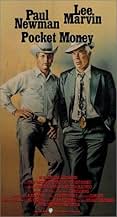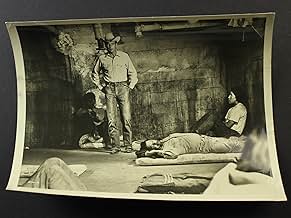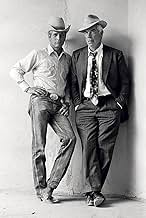NOTE IMDb
5,4/10
2,1 k
MA NOTE
Ajouter une intrigue dans votre langueBroke and in debt, an otherwise honest cowboy gets mixed up in some shady dealings with a crooked rancher.Broke and in debt, an otherwise honest cowboy gets mixed up in some shady dealings with a crooked rancher.Broke and in debt, an otherwise honest cowboy gets mixed up in some shady dealings with a crooked rancher.
- Réalisation
- Scénario
- Casting principal
Gregory Sierra
- Chavarin
- (as Gregg Sierra)
Bruce Davis Bayne
- Bank Customer
- (non crédité)
Poupée Bocar
- Girl in Bar
- (non crédité)
Richard Farnsworth
- Man
- (non crédité)
Ken Freehill
- Bank Customer
- (non crédité)
Terrence Malick
- Worksman
- (non crédité)
Avis à la une
This film is not as bad as the previous reviewer would have you believe. It just takes a different kind of mindset to enjoy it--you have to like nonlinearality. You have to be in a relaxed, maybe even coming-down-off-a-jag state of mind to appreciate its structure.
Paul Newman, affable as always in the lead, is not placed in any of the more familiar predictable, and simplistic predicaments cited by my colleague ( though, if anything, "character study" would come the closest to describing this film).
But, instead of an "easy" situation--the kind that makes us smug to be able to identify quickly--in this picture Newman battles ineffectually against a more subtle and insidious malaise, one not often focused on in film in this manner. Its a common problem--something we all deal with at one time or another--its that type of confidence-effacing, will-sapping, ego-draining personal economic debt that for many adults never really seems to go away.
Just like the rest of us, Newman's simply got an ego that wants to assert itself--but at every turn he's being strung up by the short-and-curlies due to lack of $$. He keeps trying however. Still, we see that throughout the film, each new situation somehow gets away from him and leaves him with nothing to show for his troubles. He's just too nice a guy to come out a winner.
He always needs more money than he's got and it affects everything he does--prevents him from really enjoying what might be an otherwise pleasant life. In the end he's forced to face that:
1) his troubles are maybe never going to be conquerable,
2) there will be a lot more (of the same kind of humiliation he's undergone all throughout the movie)throughout the rest of his life, and 3) despite this, there are still some dividends in life that make things easier to bear, like having a best friend, a car that runs, or just having enough money in your pocket to get a Coke.
Its true the movie has an unsatisfying conclusion--the very human plot in this film just doesnt have a happy resolution, (coincidentally, just the way real-life problems dont work out, what a concept for a film, right?).
But the hangdog ending, just like the rest of the film, is somehow difficult to forget. It has such an unusual, low-key pace and rhythm that it really stays with you. I have seen it come up at least 4-5 times on the late show and never been displeased--its rather like seeing an old friend.
Dont dismiss it--its a movie that can cheer you up under the right circumstances.
Paul Newman, affable as always in the lead, is not placed in any of the more familiar predictable, and simplistic predicaments cited by my colleague ( though, if anything, "character study" would come the closest to describing this film).
But, instead of an "easy" situation--the kind that makes us smug to be able to identify quickly--in this picture Newman battles ineffectually against a more subtle and insidious malaise, one not often focused on in film in this manner. Its a common problem--something we all deal with at one time or another--its that type of confidence-effacing, will-sapping, ego-draining personal economic debt that for many adults never really seems to go away.
Just like the rest of us, Newman's simply got an ego that wants to assert itself--but at every turn he's being strung up by the short-and-curlies due to lack of $$. He keeps trying however. Still, we see that throughout the film, each new situation somehow gets away from him and leaves him with nothing to show for his troubles. He's just too nice a guy to come out a winner.
He always needs more money than he's got and it affects everything he does--prevents him from really enjoying what might be an otherwise pleasant life. In the end he's forced to face that:
1) his troubles are maybe never going to be conquerable,
2) there will be a lot more (of the same kind of humiliation he's undergone all throughout the movie)throughout the rest of his life, and 3) despite this, there are still some dividends in life that make things easier to bear, like having a best friend, a car that runs, or just having enough money in your pocket to get a Coke.
Its true the movie has an unsatisfying conclusion--the very human plot in this film just doesnt have a happy resolution, (coincidentally, just the way real-life problems dont work out, what a concept for a film, right?).
But the hangdog ending, just like the rest of the film, is somehow difficult to forget. It has such an unusual, low-key pace and rhythm that it really stays with you. I have seen it come up at least 4-5 times on the late show and never been displeased--its rather like seeing an old friend.
Dont dismiss it--its a movie that can cheer you up under the right circumstances.
Stuart Rosenberg directed this meandering film that stars Paul Newman as Jim Kane, a near-broke cowboy who is approached by a shady rancher(played by Strother Martin) to go into Mexico to buy him some cattle and bring it back. Though suspicious, Jim needs the money, so takes a chance and accepts the job. While there, he meets up with old friend Leonard(played by Lee Marvin) who is also in need of money, so they team up to collect the cattle, but their suspicions are confirmed when the deal goes awry, placing them in a tough situation... Thoroughly blah film coasts along on its star power, which is considerable, though film never amounts to much and is largely unmemorable.
Throughout this thoroughly confused movie, I kept waiting for the point to become clear. Is it an innocent cowboy against the the corrupt cattle barons movie? Is it a buddy movie? A character study? What's the point?
Paul Newman seems to be playing a slightly retarded rancher, with an accent that is neither consistent nor believable. Lee Marvin plays the only character that is at least interesting, even though it's not at all clear just what his purpose in the movie is. Strother Martin is just painful to watch.
Mexicans may want to avoid this movie. It contains enough slurs to keep the producers in law suits for a decade if it had been produced in the more politically correct 90's.
It was a struggle to stay awake through this movie. I sure hope the book was better.
Paul Newman seems to be playing a slightly retarded rancher, with an accent that is neither consistent nor believable. Lee Marvin plays the only character that is at least interesting, even though it's not at all clear just what his purpose in the movie is. Strother Martin is just painful to watch.
Mexicans may want to avoid this movie. It contains enough slurs to keep the producers in law suits for a decade if it had been produced in the more politically correct 90's.
It was a struggle to stay awake through this movie. I sure hope the book was better.
A low-key and wry modern-day western from the early-'70s. Filmed in Arizona and Northern Mexico in the spring and early summer of 1971 and shown in cinemas in that most downbeat of hippy years -1972: it records the 'feel' of the early-'70s which were pioneering years so well. Jim Kane (good-looking blue-eyed US actor Paul Newman) is a naive, broke and in debt cowpoke i.e. An everyman and loser. Needing the money, he agrees to work for a pair of crooked rodeo cattle dealers -Bill Garrett (Strother Martin) and Stretch Russell (Wayne Rogers) who hire him to squire 250 steers from Mexico to Arizona. Kane locates his equally broke buddy Leonard (Lee Marvin) in a Mexican hotel room and the two undertake the imprudent business venture with failed results marked by their inability to make astute decisions. The inner rhythm of the film is strange, languid and existential with Beckettian undertones. It features some great scenes - the sun-bleached urban aesthetics of Nogales, Phoenix, Chihuahua and Hermosilla and the enchanted and evocative interior scenes featuring exotic Mexican bordellos, bars, mariachi/rock and roll musicians, street hucksters etc plus the barren cattle lands of Northern Mexico and the Mexican transport/rail infrastructure ca. '71-72 all recorded by ace Hungarian cameraman Laszlo Kovacs. Leonard - who sports white hair, a 'Forties style suit, fedora hat and jazzy tie in one scene is seen imbibing olives, fajitas, tacos, chili and the Cuervos-brand of tequila. Pocket Money is in my top ten films of all time.
The above line of dialog is all you need to know about the abbreviated mental capacity of the two lead characters played by Paul Newman and Lee Marvin, and why they were such losers trying to be important cattle brokers in Mexico, and of course failing miserably. The Summary quote above was just one of Marvin's many bright ideas that went nowhere.
Newman and Marvin were terrific here, but two other stars in this comedy, to me, were Marvin's great old '60's red Buick convertible and, of course, the terrific Strother Martin, whose hilarious line of "wait, wait, wait" in this film was almost as effective as his very famous one in Cool Hand Luke and his less famous one in Butch Cassidy of, "yes, there are plenty of jobs don't you want to know why?" He was the best at memorable lines, and he had some of the best ones in many of Newman's films over the years. Wayne Rogers(MASH) was in it too, playing a cattle buying middleman who was just about as dumb as the star characters.
This film was very entertaining in the very funny and goofy way Newman and Marvin played off each other with their lines, both thinking they were so clever when they were really just abject loser dopes. Newman's character was actually a good and simple guy underneath it all but he was just too dumb to breath out, and Marvin's sleazy small time crook and deal negotiator character thought he was so clever but was actually laughable in his incompetency. "Spies are everywhere", he said as he grossly overestimated his importance to the world, which was next to nothing.
Reminded me a lot of old Laurel and Hardy film stories, where great plans always came to nothing after much useless, but hilarious, activity.
Very entertaining film and a lot better than its rating for the very funny interplay of these 3 terrific actors.
Newman and Marvin were terrific here, but two other stars in this comedy, to me, were Marvin's great old '60's red Buick convertible and, of course, the terrific Strother Martin, whose hilarious line of "wait, wait, wait" in this film was almost as effective as his very famous one in Cool Hand Luke and his less famous one in Butch Cassidy of, "yes, there are plenty of jobs don't you want to know why?" He was the best at memorable lines, and he had some of the best ones in many of Newman's films over the years. Wayne Rogers(MASH) was in it too, playing a cattle buying middleman who was just about as dumb as the star characters.
This film was very entertaining in the very funny and goofy way Newman and Marvin played off each other with their lines, both thinking they were so clever when they were really just abject loser dopes. Newman's character was actually a good and simple guy underneath it all but he was just too dumb to breath out, and Marvin's sleazy small time crook and deal negotiator character thought he was so clever but was actually laughable in his incompetency. "Spies are everywhere", he said as he grossly overestimated his importance to the world, which was next to nothing.
Reminded me a lot of old Laurel and Hardy film stories, where great plans always came to nothing after much useless, but hilarious, activity.
Very entertaining film and a lot better than its rating for the very funny interplay of these 3 terrific actors.
Le saviez-vous
- AnecdotesThe movie's publicity still with Paul Newman and Lee Marvin was photographed by British photographer Terry O'Neill and also appears on the jacket of O'Neill's 2003 compilation coffee-table book "Celebrity." In the book, O'Neill recounts how when he arrived on the set to shoot his publicity stills, Lee Marvin was hungover and in a foul mood. Most of the production personnel were steering clear of him. When O'Neill gingerly approached Marvin and introduced himself, Marvin asked, "Are you English?" What O'Neill didn't know at the time was that Marvin was a lifelong Anglophile--he LOVED the British. After that brief encounter, Marvin's mood changed and, according to O'Neill, he couldn't have been more cooperative for the rest of his assignment.
- GaffesJim asks Adelita if she's ever been out of the country, and she says she's only been to a Catholic school in San Antonio. Yet she has a thick, mid-Atlantic, prep-school accent, without a trace of the south or Spanish in it.
- ConnexionsFeatured in Hollywood Remembers Lee Marvin (2000)
- Bandes originalesPocket Money
Written and Performed by Carole King
Meilleurs choix
Connectez-vous pour évaluer et suivre la liste de favoris afin de recevoir des recommandations personnalisées
Détails
Box-office
- Budget
- 2 700 000 $US (estimé)
- Durée1 heure 42 minutes
- Mixage
- Rapport de forme
- 1.85 : 1
Contribuer à cette page
Suggérer une modification ou ajouter du contenu manquant

Lacune principale
By what name was Les indésirables (1972) officially released in India in English?
Répondre

































